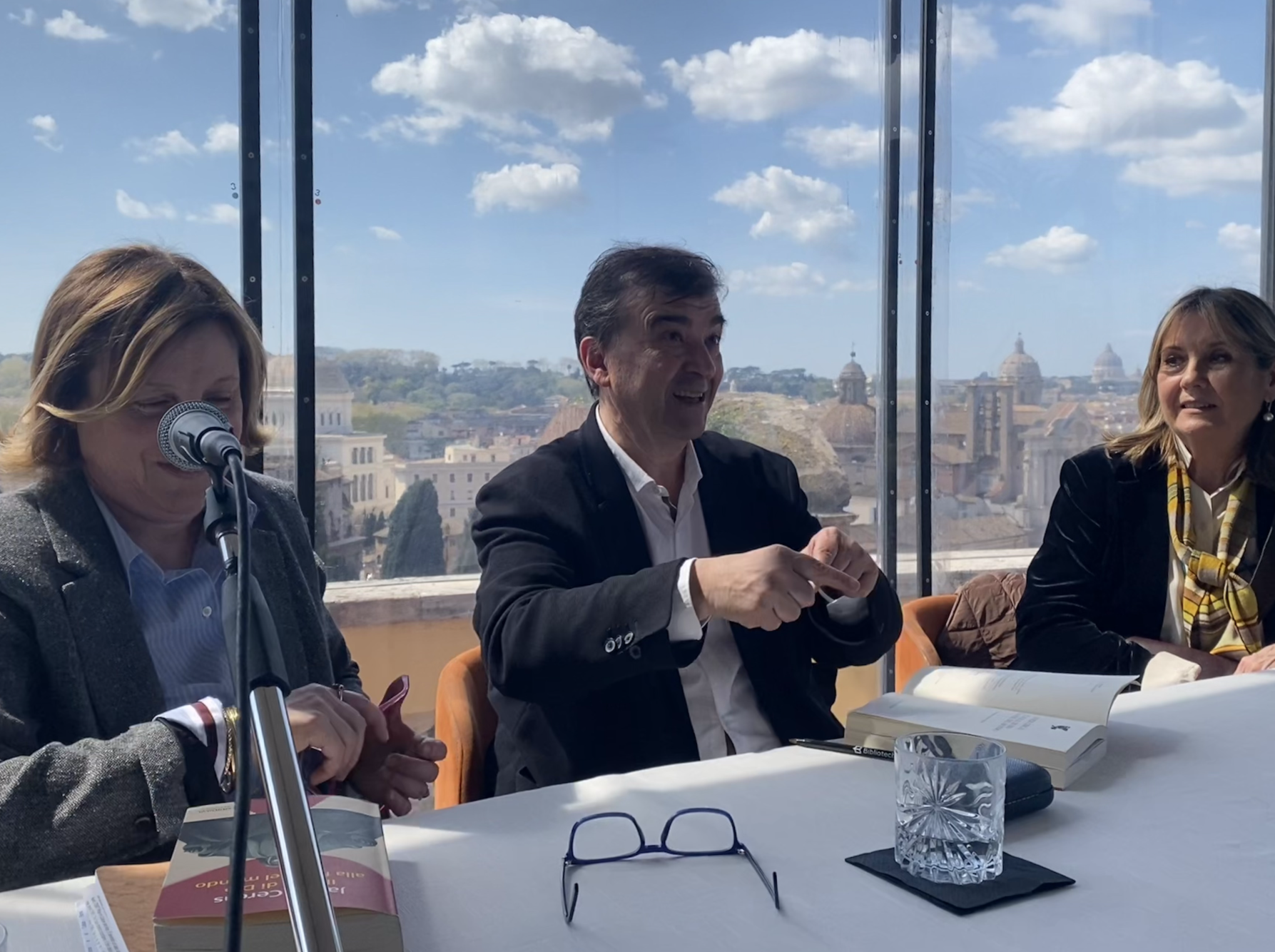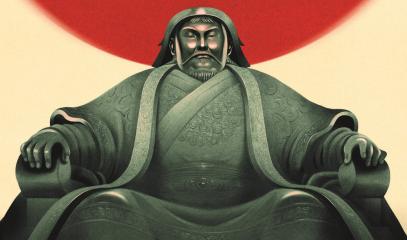Javier Cercas, in Mongolia with the Pope: Missionaries are true fools of God
In his new book, the Spanish writer recounts his trip to Ulaanbaatar with Pope Francis in 2023. As a convinced atheist, he discovered the "radicality" of men and women religious who help people without proselytising. For him, they embody the pontiff’s “missionary and poor Church”, he said yesterday at a meeting with the press in Rome. The novel narrates the meetings with Fr Ernesto Viscardi and Sr Ana Waturu.
Rome (AsiaNews) – The idea is sensational. In May 2023, Javier Cercas, an atheist and avowed anticlerical Spanish writer, was approached by Lorenzo Fazzini, head of Libreria Editrice Vaticana (LEV), the Vatican Publishing House, for an unprecedented and absolutely unexpected proposal: to follow Pope Francis to Asia, on his 43rd apostolic journey to Mongolia.
The East Asian country is home to a tiny Catholic community (about 1,500 faithful out of 3.4 million), lying on the extreme "periphery" of the Christian world, and therefore a land of mission. This led to “Il folle di Dio alla fine del mondo" (God’s fool at the end of the world), published by Guanda in Italy, a "novel without fiction", which hit bookstores in Italy, Spain and Latin America[*] on 1 April 2025.
The Vatican offered Cercas the opportunity to write a book on this "adventure", with absolute freedom regarding content and form. He hesitated for a while. “Don't you know that I'm a dangerous guy?” was his first reaction. Then he accepted. Spoiler: The story does not end with Javier Cercas’s conversion.
Jokingly, he says, “I wouldn’t be able to sell any copies”. But he admits that in Mongolia he was touched by Pope Francis’s “missionary and poor Church,” which is the very core of Pope Francis’s pontificate.
The writer described the Argentinian as a “pope from the periphery” during a meeting yesterday with the press, including AsiaNews, at the Caffarelli terrace, on the Capitoline Hill in Rome, as part of an international Literature festival.
“Who represents this true Church, this radicality? The missionaries, without a doubt. It's impossible not to admire them," he said.
Although Javier Cercas has not embraced the faith he lost "many years ago", as he often says, after the trip (31 August-4 September 2023) to the Buddhist-majority state caught between Siberia and China, he ironically said that he had found the solution "to all the problems of the Church”. “All be missionaries! If you are all missionaries then the problem is solved," he said.
For the writer, missionaries are "God's true fools,” a reference to the saint of Assisi from whom the Jorge Mario Bergoglio took his papal name. The "fools", “Bergoglio's soldiers", as Cercas calls them in the book go by the name of Father Ernesto, Father Giovanni, Sister Ana, Sister Francesca, and other characters, with whom the writer had long conversations.
"They do totally abnormal things. They abandon their family, home, country, without worrying about money, professional ambition... all this to go to Mongolia, or to Africa.”
“To do what?” he asks. “To help people. Not even to convert people. This is forbidden in Francis’s Church of Francis. It is not proselytising. It is helping those in need. How can we not admire all this? This thing is something absolutely revolutionary, subversive.”
For Javier Cercas, who received a strict Catholic education as a young man, the missionary is "the ideal Christian. He is the one who takes Christ's message seriously. It is Francis’s revolution, an extraordinary radicality, which means the return to primitive Christianity," he said.
Fr Ernesto Viscardi appears in the book because he organised a meeting with the Buddhist monks from the monastery of Dashichoilin. A Consolata missionary, he arrived in the country in 2004 (only Card Giorgio Marengo, Apostolic Prefect in Ulaanbaatar, arrived earlier). “The only Catholic missionary who arrived in Mongolia of his own free will, not destined here by his superiors," writes Cercas.
“He knew [...] that Asia was an immense continent, reluctant to Christianity." He served at the "Rising Sun" centre, in Chingeltei, on the outskirts of the capital. “He and his companions take in poor children and teenagers without families to whom they offer shelter, food, education, fun and affection.”
The next character in “God's fool at the end of the world" is Father Giovanni, an Oblate of Mary Immaculate, a former missionary in South Korea, with “almost thirty years in Beijing," writes Cercas.
The Spanish writer also writes about meeting with Sister Ana Waturu, from Kenya, a Consolata missionary, director of Caritas in Mongolia, describing the conversation inside Ulaanbaatar cathedral, which is dedicated to Saints Peter and Paul, and serves as headquarters of the Christian charity.
“She directs a group of 20 volunteers, not all Catholics, mostly between 30 and 40, committed to assisting people who request it, providing them with food, clothing, shelter and aid of all sorts,” he says.
The writer also had the opportunity to speak with "the youngest of the Consolata missionaries destined for Mongolia,” Sister Francesca Allasia, who was 35 in 2023.
In Asia for a few months, she was on her first missionary experience, arriving after her studies in Rome. “She began to talk about the kids in the Rising Sun Centre as if they were her children, but I immediately understood that, in reality, for her, they are really her children," Cercas writes in the book.
AsiaNews yesterday attended the author's talk with Italian journalists Aldo Cazzullo, who also appears in the book, and Sabina Minardi, in Rome’s Auditorium Parco della Musica.
On this occasion, Cercas explained that his journey was marked by two factors. The first, the "geopolitical" one (which is actually the less important one), is the Church’s turn to the East, and therefore to Beijing. "China is very important; in fact, there are not many diplomatic ties. It is an obsession of the Jesuits and the pope. The trip to Mongolia also served to get closer to it," he said.
At the end of the trip, at the Mass in the Steppe Arena on Sunday, 3 September 2023, Pope Francis sent “a heartfelt greeting to the noble Chinese people.”
But for Javier Cercas, the second factor, religion, is key, it is “the core of the book”. The author, “the most important civil writer in Europe,” says Cazzullo, accepted the Holy See’s proposal on one condition: that the pope grant him “five minutes” face-to-face.
Cercas wanted to ask the pontiff a question. “So I boarded this plane to ask Pope Francis if my mother will see my father beyond death, and to bring my mother his answer. Here is a fool without God who pursues God's fool to the end of the world," he writes. This enigma, “a child's question,” accompanies Javier Cercas’s new novel, turning into a thriller about existence that will be solved by a “small miracle”.
[*] Spanish title: El loco de Dios en el fin del mundo. Published by Literatura Random House.








.png)










